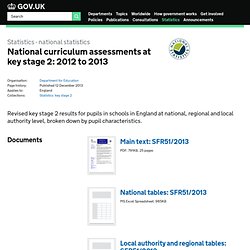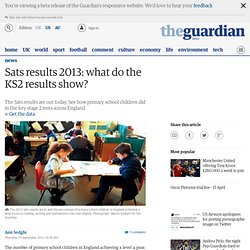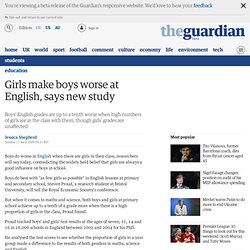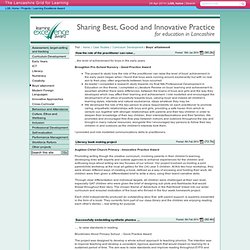

Eacea.ec.europa.eu/education/eurydice./documents/thematic_reports/120EN. National curriculum assessments at key stage 2: 2012 to 2013 - Publications. This statistical first release (SFR) provides revised 2013 key stage 2 national curriculum assessment results for pupils in schools in England at national, regional and local authority level.

Information on attainment will also be broken down by pupil characteristics, specifically gender, ethnicity, first language, free school meal eligibility, disadvantage, special educational need (SEN) and Income Deprivation Affecting Children Index. It includes results from the key stage 2 tests in reading, mathematics and grammar, punctuation and spelling and on key stage 2 teacher assessments in English, mathematics, science, reading and writing. It also includes figures on expected progress between key stage 1 and key stage 2.
The revised figures are based on data checked by schools prior to publication in the primary school performance tables. The figures contained within this publication will combine this revised data with the information gathered through the school census in January 2013. GCSE National subject grade percentages - Girls only. GCSE National subject grade percentages - Girls only. GCSE National subject grade percentages - Boys only. GCSE and equivalent attainment by pupil characteristics: 2012 to 2013 - Publications. This statistical first release (SFR) provides revised information on GCSE and equivalent attainment for pupils attending state-funded schools in England in the 2012 to 2013 academic year.

It is broken down by different pupil characteristics: gender ethnicity eligibility for free school meals disadvantage special educational needs (SEN) English as a first language The main points from this release are that: Working class boys: why we must raise their attainment. David Willetts's recent comments about white working class boys and university were quickly followed by a "rant" from Ian Silvera damning the comprehensive system which he blames for the underachievement of this group.

Frankly, I fail to see the causal relationship between the two. If only it were that simple. Silvera says Willetts "has now joined a long list of politicians who refuse to admit the obvious. The comprehensive system has failed". Www.literacytrust.org.uk/assets/0001/4056/Boys_Commission_Report.pdf. Www.literacytrust.org.uk/assets/0001/4056/Boys_Commission_Report.pdf. Teachers TV: Raising Boys' Achievement - Part 2. Raising boys' achievement : Primary.
Raising Boys' Achievement. Back to Education List My Home Page Parent Advice Sheet The subject of raising the achievement of boys is one that is attracting a lot of attention and interest in the current educational scene. Although there has always been a gap between girl and boy achievement, especially at the 11+ where girls had to score a higher mark than boys to gain grammar school entry, it is generally accepted that the gap between achievement of boys and that of girls is widening at an alarming rate.
I will start by reviewing some of the statistics that reflect the cause of concern and some of the suggested explanations for difference, including arguments from both sides of the nature-nurture debate. Following this I will introduce some of the strategies that have been suggested to help improve achievement in boys without putting girls at a disadvantage. At a recent conference the Devon Statistician, Robert Oxburgh, gave a snapshot of county statistics. Peer group pressure is very strong.
River Crossings. 1. 1. Girls get higher marks than boys at school 'because they are better behaved' Closing Achievement Gaps:With Boys and Girls in Mind. New positron emission tomography (PET) and MRI technologies enable us to look inside the brains of boys and girls, where we find structural and functional differences that profoundly affect human learning.

These gender differences in the brain are corroborated in males and females throughout the world and do not differ significantly across cultures. It's true that culture affects gender role, gender costume, and gender nuances—in Italy, for example, men cry more than they do in England—but role, costume, and nuance only affect some aspects of the learning brain of a child. New brain imaging technologies confirm that genetically templated brain patterning by gender plays a far larger role than we realized. Gender gaps in school achievement: study yields surprises. It's not exactly a news flash, but boys and girls are different — and not just physically.

Around the world, boys have somewhat higher achievement in mathematics, a well-known phenomenon. But the gap between reading achievement is three times as large, and it’s the girls who get the high scores. The results come from a study that examined math and reading scores over 10 years on the Program for International Student Assessment — 1.5 million students in 75 countries participated. "Girls' higher scores in reading could lead to advantages in admissions to certain university programs, such as marketing, journalism or literature, and subsequently careers in those fields," according to a press release for the study. GCSE and equivalent attainment by pupil characteristics in England: 2011 to 2012 - Publications. Call-for-probe-into-gcse-gender-gap-8781308. This summer's results revealed 24.8% of girls' were awarded at least an A grade, compared with 17.6% of boys.This gap of 7.2 percentage points is believed to be the biggest since GCSEs were introduced in the 1980s.

Prof Alan Smithers, of the Centre for Education and Employment Research at Buckingham University, told The Daily Telegraph that successive governments have failed to get to grips with the continuing lack of progress by boys in comparison to girls. "The difference is so great, particularly in English, that we really need to look carefully at whether there's a more fundamental problem here with the way we teach boys," Prof Smithers said. "The Government ought to commission a thorough study into just why boys' performance is so poor.
That would involve going into classrooms, talking to teachers, talking to pupils and finding out which part of the assessment process really holds boys back. " She added that the Government also plans to overhaul school performance tables. Sats results 2013: what do the KS2 results show? The number of primary school children in England achieving a level 4 pass in reading, writing and mathematics at key stage 2 (KS2), rose slightly on last year with 76% of pupils reaching the benchmark for their age group in 2013 compared with 75% in 2012.

Although the provisional result published by the Department for Education (DfE) show that further progress has been made, the one percentage point increase since the 2012 results suggest that a significant percentage of pupils are leaving primary school without a sufficient grasp of reading, writing and maths. DFE-RR238.pdf. Girls make boys worse at English, says new study. Boys do worse in English when there are girls in their class, researchers will say today, contradicting the widely held belief that girls are always a good influence on boys in school.

Girls 'believe they are better than boys from age four' 1 September 2010Last updated at 12:20 Girls believe they are cleverer, better behaved and try harder than boys from the age of four, research suggests.

By the age of eight, boys had also adopted these perceptions, the study from the University of Kent found. GCSE results 2013: girls stretch to record lead over boys. Webarchive.nationalarchives.gov.uk/20130401151715/ Case Studies : Curriculum Development : Boys' attainment. Crawshawbooth Primary School - Good Practice Award The outcome of our project is to disseminate outstanding practice through coaching and mentoring of all teachers, teaching assistants and staff in order to raise the teaching from 'good' to 'good with outstanding features'.

The ethos of the school is one of team work with an atmosphere of staff learning from each other with good self-evaluation skills. We achieved the Good Practice Award in 2010 for AfL and the Creative Curriculum and we wanted to build on this by developing the Coaching project throughout the school in order to raise attainment in teaching, particularly in Literacy.
All staff received Coaching training from the adviser. This has been followed up by regular staff meetings to focus on coaching linked to the Boys' Writing Project and AfL (our school improvement priorities). After only half a term there has already been a noticeable improvement of the quality of teaching observed during lesson observations. Phonics screening check and national curriculum assessments at key stage 1 in England: 2013 - Publications. This Statistical First Release (SFR) provides provisional 2012/2013 information on the achievements of both eligible pupils in the phonics screening check and those pupils at the end of key stage 1 (KS1) in their national curriculum teacher assessments by level, gender, ethnicity, English as a first language, free school meal eligibility, special educational need and the income deprivation affecting children index (IDACI).
Breakdowns of achievement for disadvantaged pupils were added to both the phonics and key stage 1 tables on 12th December 2013. The phonics screening check introduced in 2012 is a statutory assessment for all children in year 1 (typically aged 6). All state-funded schools with a year 1 cohort must administer the checks. Those pupils who did not meet the standard in year 1 or who were not tested are re-checked at the end of year 2 (typically aged 7). The KS1 teacher assessments measure pupils’ attainment against the levels set by the national curriculum. National Curriculum Assessments at Key Stage 1 in England - Datasets. Release Calendar. Past and future editions of 'National Curriculum Assessments at Key Stage 1 in England' Negative stereotypes about boys hinder their academic achievement.
Www.literacytrust.org.uk/assets/0001/4047/BRC-_Research_overview_-_Final.pdf. SFR37-2013_Text. Why boys trail further behind girls at GCSE top grades. 25 August 2011Last updated at 17:41 By Hannah Richardson BBC News education reporter Both boys and girls achieved record results this year Girls have opened up the biggest achievement gap over their male classmates in the top grades at GCSE since the A* was introduced. Some 19.8% of boys entries were awarded an A* or an A this year compared with 26.5% of girls entries - a gap of 6.7 percentage points. Www.edu.gov.on.ca/eng/research/boys_literacy.